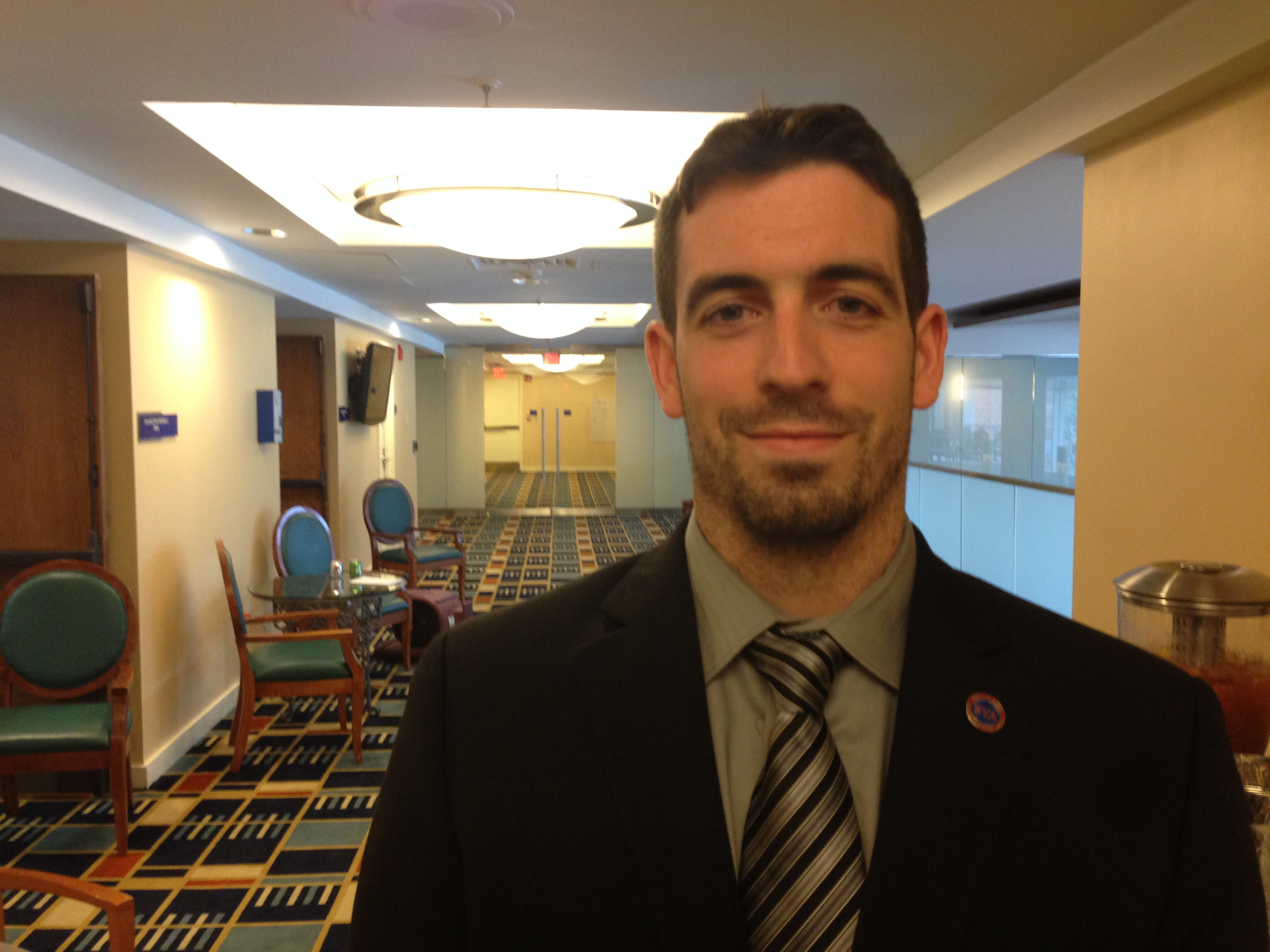
Army veteran Michael Robbins at UMass Lowell. (Kirk Carapezza/WGBH)
While the U.S. still finds itself tangled in the wars in Iraq and Afghanistan, colleges and universities are expecting an influx of veterans and they are preparing to welcome them onto their campuses.
______________________________________________________
On a recent afternoon at the University of Massachusetts in Lowell, about 100 student veterans and career counselors filed into a conference room.
Fresh from duty in Afghanistan and years ago in Iraq, the veterans sat shoulder-to-shoulder. After multiple deployments, their next mission is to get an education - and find a job outside the military.
At these university-sponsored career events, they sip coffee, dust off their resumes, and gather much-needed advice as they begin their hunt for a job.
Michael Robbins of Pepperell was in middle school when the war in Iraq began. Coming from an old military family, Robbins, 26, says he always knew he would enlist in the army.
"When other kids were reading comic books, I was reading about Civil War generals,” Robbins said. “I had a pretty good idea of the cost of war."
What Robbins didn’t fully grasp was how tough it would be to come home after two tours in Iraq and a third in Afghanistan. He knew the job search wouldn’t be easy, in part, because he’s interested in foreign policy.
“I was an infantryman,” Robbins said. “That doesn’t translate well to anything really, except if you want to be a cop, fireman or security guard.”
Robbins was transferring from community college to UMass Lowell, when one of his former platoon mates overdosed on heroin. Robbins says his friend was badly injured from a bomb blast and then grew addicted to morphine.
“It wasn’t pretty,” Robbins recalled. “I was in really rough shape after that. I almost didn't make it through January. There are just some things that the school doesn't quite understand."
For example, campus orientations are typically geared toward 18 and 19-year-old students, when veterans tend to be in their mid twenties and early thirties.
"That creates a challenge when you have to dedicate a whole day to walking around a campus, learning the ins and outs when really you have stuff to get back to,” Robbins said.
All but 9,800 U.S. troops are scheduled to be out of Afghanistan by the end of the year, and Massachusetts is expected to have nearly 50,000 post-9/11 veterans home by 2030. And more than 70 percent of them will probably go back to school.
To prepare, UMass Lowell's Director of Veterans Services Janine Wert says the university is increasing staff and launching more veteran support programs.
"Having that social support is really important when you are transitioning," Wert said.
When asked if there’s more she feels the schools can do, Wert replied, “I don't know that we're ever done. When do you say, 'We're done taking care of veterans?'"
Of course, there is always room for improvement. One issue is that many veterans struggle to transfer their military experience into academic credit. At UMass Lowell, Wert says the university is hoping to develop new ways to recognize what soldiers learn in the field.
"We don't want veterans to have to repeat work they've already done, and we want them to graduate and go forward with their lives," Wert said.
UMass Lowell is recognized nationally for its veteran support. But Peter Buryk, a project associate at the RAND Corporation, finds that most schools are not as well prepared because they lack basic information.
“If you ask the simple question to an institution of how many veterans are on campus, the typical answer we've gotten recently is, 'Well, We're not sure,'” Buryk said. “They self-report but we don't have an effective way of tracking them."
When asked whether colleges and universities are ready to receive veterans, Buryk, who served in the Navy, gave them a B+.
"I think that as more veterans come on campus and have a stronger voice, institutions may be motivated to improve their services and maybe we can get up to the A range," said Buryk.
Back at UMass Lowell, Michael Robbins just declared his major: international politics. Nine years ago, during his first tour of duty in Iraq, Robbins realized he wouldn't be in the military forever.
“There’s a lot of stuff that I’m not utilizing that I know I could use somewhere else,” Robbins said. “I had access as a 19-year-old to very important meetings in Baghdad. It really sparked my interest in how the world interacts with itself.”
Now, he's hoping potential employers will recognize his experience and the leadership skills he has developed as he tries to land his first job outside the barbed wire.










